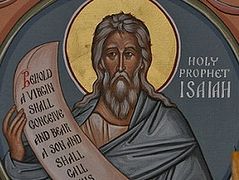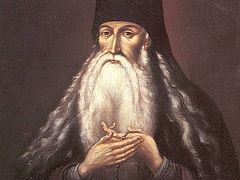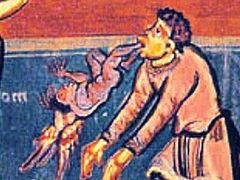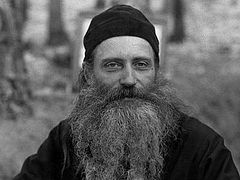To not give in to the enemy—that is the main rule for those who are fighting a war. An army commander warns every soldier ahead of time about the threat of enemy subterfuge, so that they would not be deceived and taken captive. A soldier left alone, hungry, shivering and without warm clothing undergoes a strong temptation to give himself up to the enemy. The cunning adversary will take advantage of his situation with all possible means. He will deprive himself of bread in order to throw a bit of it at the soldier and give him the impression that he has an abundance of food. He’ll remain dressed in rags, half-naked and freezing, just to throw him some a piece of clothing to make him think that he himself is well dressed and rich. He will start throwing letters boasting of his already assured victory and deceive the wretched soldier, saying that many of his comrades at arms have already given up left and right, that his general has been killed, or his king is pleading for peace! He’ll then promise a speedy return to home and hearth, and rank, and money, and everything that a man in extreme need can see only in his dreams. The commander describes all of these enemy tricks and traps to the soldiers, warning them not to believe any of it but to hold their position, not give up, and remain loyal to their standard to the death.
Not giving in to the enemy is also the main rule for the soldier of Christ, who wars with the evil spirits of this world. And Christ, as our King and Leader in this warfare, warns us about all of this and cautions against it all. Behold, I have told you before (Mt. 24:25; Jn. 14:29) He says to His disciples. The danger is great, and the enemy of mankind is more terrible and cunning than any other possible enemy. The Lord expresses this in another place: Satan hath desired to have you, that he may sift you as wheat (Lk. 22:31). Satan continually desires to have people from the day that he deceived the first man—from that very day he announces his right to have the human race and takes it away from God is if it belonged to him. Through all possible deceptions he attracts Christ’s warriors to himself, luring them with false promises and showing them his riches. No one is hungrier than he; yet he shows bread to hungry people, calling them to give in. No one is more naked than he; yet he lures people with his imaginary colors and deceptive garments. There is no one poorer than he; yet like a charlatan at the market he rubs two coins together and deftly shows them to the greedy onlookers as if he possessed millions. No one has ever suffered a greater loss than he; yet he never stops lying about it, acting as if he were the victor, as if Christ’s army has been broken, and as if Christ has given up and hidden himself away from the battlefield. He is a liar and the father of lies, and all his power and all his possessions amount only to lies. Having warned His followers about all the devil’s deception and a weaponry, our Lord Jesus Christ has also taught them by His own example how to withstand all of this, and what weapons to use in the battle.
First of all, the main weapon for us followers of Christ is Christ Himself. His presence with us and his power in us are our most important weapons. His last words written in the Gospel are, Lo, I am with you always, even unto the end of the world. Amen (Mt. 28:20). And lo, truly His presence was manifested throughout the centuries upon millions of His fearless warriors: the apostles, martyrs, confessors, God-bearing fathers, pious virgins, and holy hierarchs; and it was not only manifested in the past, but even now it is clear and undoubted to all who have not completely given themselves up to the evil spirit. And it is not only manifested now, but also in the last times such powerful God-bearers as Enoch and Elias (Rev. 11:3) will shine forth. Just as clear and undoubted is the power of His Body and Blood, His suffering, His words, His honorable and life-giving Cross, His Resurrection and His eternal glory. You who have believed in this invincible power of Christ, which like an electrical current ceaselessly flows through those who are faithful to Him, tell others about it! And you who have not yet believed but desire to believe, do everything that the Gospel tells you to do, and you will believe. Let the malevolently doubting doubt. Their malevolence brings evil not to God but to them; their doubt brings harm not to God but destruction to them. Soon the time will come when it will be impossible to doubt—but they will not be able to believe.
But besides the presence and power of Christ—our main weapon in the struggle against the evil spirit—the Lord Jesus Christ counseled us to use also certain kinds of weapons that we ourselves, with His help, must forge. This weaponry is ceaseless repentance, ceaseless mercy, ceaseless prayer, and ceaseless joy in the Lord Jesus Christ; fear of the Judge, and of destruction of the soul; then, cheerful bearing of suffering for the Lord’s sake with faith and hope and forgiveness of offences; and a relationship to this world of everything that exists as if it didn’t exist; and Communion of the Holy Mysteries of Christ, and vigil, and fasting. We note fasting at the end not because fasting is the least important weapon—God forbid! But we do so only because today’s Gospel passage speaks of fasting, and we would like to explain this passage.
For if ye forgive men their trespasses, your heavenly Father will also forgive you: But if ye forgive not men their trespasses, neither will your Father forgive your trespasses. Thus begins today’s Gospel. Why does it begin like this? You ask: “How is this connected with fasting?” It is connected, and very closely, as closely as the final section of the Gospel is connected with fasting that says nothing about fasting but rather talks about gathering treasures not on the earth but in heaven, where neither moth nor rust can destroy it, and where thieves can’t break in and steal it. For if we are to understand fasting in the truly Christian and not legalistic and pharisaical sense, then forgiving offenses and refraining from avarice are a fast, and the most important fast at that; or, if you will, they are the most important fruit of the fast. This is because, truly, refraining from food is worth very little without refraining from paying offences with offence and refraining from being blinded by earthly goods.
The Lord does not command us by force of authority, saying, “Forgive people their trespasses!” He leaves it to our own will whether to forgive or not to forgive. He does not want to violate our freedom and force us to do something—for then our works would not be truly ours but His, and would not have the same value as if we had done them freely and voluntarily. He truly does not command us by force of authority, but He warns us what will happen: neither will your Father forgive your trespasses. Then who forgives us our trespasses if not God? No one, neither on heaven nor on earth—no one. People will not forgive us because we do not forgive them, and God will not forgive us, for people do not forgive us. Where then are we and where will we be? Then we will live this age under a mountain of sins, and in the next life the weight of this mountain will increase and fill all eternity. Therefore we will strive to not repay people with offense for offense and evil with evil, or sin for sin. For lo, if you see a drunken man who’s fallen into the dirt will you lie down in the dirt next to him? Won’t you try to lift him out of the dirt? Every sin is dirt, and every passion is drunkenness. If your brother has plunged his soul into the defilement of sin, should you also lay your soul down into the same defilement? So refrain from what your sinful brother does, and hasten also to lift him out of it and clean it off; for the Heavenly Father lifted and cleansed you of all your sins both secret and obvious, and has placed you amidst His angels at the Dread Judgment.
Moreover when ye fast, be not, as the hypocrites, of a sad countenance: for they disfigure their faces, that they may appear unto men to fast. Verily I say unto you, They have their reward. Hypocritical also is the one who fasts not for God and not for his own soul but for people, so that they would see him fasting and give him praise. But since not all the people can see every day what they are eating and drinking, the hypocrites try to make their faces appear such that their fasting can be read on them. They take on morose faces, make them pale and gloomy, sullen and gaunt. They do not anoint their heads with fragrant oil and do not wash their faces. And people look at them, admire them and praise them. People honor them with their admiration and reward them for their fasting with praises. What more then could they expect from God? After all, they did not fast for God. They fasted for people. What reward for their souls can they count on? After all, they did not fast for their souls—they fasted for people, and people rewarded them with praise. Truly, they already have received their reward. And God owes them nothing and will give them no reward for their fasting in eternal life.
But thou, when thou fastest, anoint thine head, and wash thy face; that thou appear not unto men to fast, but unto thy Father which is in secret: and thy Father, which seeth in secret, shall reward thee openly. Here is the main rule of fasting. The outward meaning is clear. If you fast you do it for God and for the salvation of your soul, and not for people. It is absolutely of no importance whether people see or know that you are fasting; it is even better for you that they don’t see or know it. Then you will not be expecting any reward from people. For what can people give you if they themselves are waiting for something from God, just like you? It is important that God sees and knows. And God will see it in any case; nothing can be hidden from God. Therefore do not show off your fasting with the help of some outward signs. God reads your heart not according to external signs; He reads it from the inside, from the heart itself. As you anointed your head before the fast, so anoint it during the fast; and as you washed your face before the fast, so wash it during the fast. Anointing or not anointing the head does not increase your merit before God; and washing or not washing the face neither saves your soul nor destroys it.
But these words of Christ’s, anoint thine head, and wash thy face, said so purposefully, have a profound inner meaning. For if the Lord had meant only the physical head and face, He of course would not have given the commandment to anoint thine head, and wash thy face; but He would have said that for the fruits of fasting it is secondary and insignificant whether you have anointed your head or washed your face. Obviously there is a mysterious hidden meaning in these words. Besides, the person who understands this affirmative commandment of Christ in its external sense and begins the fast by intentionally anointing his head and washing his face would be falling into another, contrary form of hypocrisy. He would also be exhibiting his fast to people, only by another means, and the Lord particularly wanted to break people of this habit. Thus, without a doubt, this commandment has it own inner meaning. What is it? The one that the apostle Paul gives to circumcision, calling saving only the circumcision of the heart, while outward circumcision is the same as no circumcision at all (cf. Gal. 6:15; Rom. 2:29). And anoint thine head means precisely: Anoint your head with the Holy Spirit. For the head signifies the mind and the whole soul, and the fragrant oil with which the head is anointed is the Holy Spirit. And this means: Do not accept any evil thoughts, and refrain from all filthy and indecent words; to the contrary, fill your mind with divine contemplation, thoughts of holiness, purity, faith, love, and everything that is worthy of the Holy Spirit. Do the same with your tongue—for the speech and the mind are one—and either say nothing at all, or, if you speak, say only what serves to the glory of God and the salvation of the soul. Do exactly the same also with your heart: Refrain from all hatred and anger, envy and pride, blasphemy against God and people, from all sin and sinful desires, passions and lusts—renounce all this and allow the Holy Spirit the possibility to sow the field of your heart with all species of divine and God-pleasing grains and heavenly flowers. Do exactly the same also with your will: Refrain from all sinful intentions and sinful deeds, incline away from all evil and allow the Holy Spirit the possibility to anoint your hardened soul with itself like fragrant oil, heal its wounds, restore it to God, make good works pleasant to it, and fill it with the thirst for every good thing that is in God.
Here is what it means to anoint thine head. In a word: Bridle your inner man, which is the main man, and restrain him from every evil, and instruct him in everything good.
What do the words, and wash thy face, mean? The face means the outward, physical, sensual man; in a word—the human body. Through the body the soul shows itself to this world. For God, a man’s face is his soul, but for the world a man’s face is his body. With the help of bodily senses and organs we show the world what we think, feel, and want. The tongue says what the mind thinks; the eyes reflect with the heart feels; the hands and feet bring to pass what the will of the soul wants.
And wash thy face means: Cleanse your body from committing any kind of sin, any impurity and any evil. Restrain your feelings from everything intemperate and destructive. Forbid your eyes from ceaselessly wandering over this motley world; forbid your ears from listening to whatever does not serve for the salvation of the soul; forbid your nostrils from intoxicating your soul with the aromas of this world that quickly turn into stench; forbid your tongue and belly from lusting after large quantities of food and drink; in general, do not allow your body to luxuriate and demand more from you than is needed for existence. Furthermore, forbid your hands from beating and tormenting people and animals; forbid your legs from heading towards sin, from going to mindless banquets, to godless entertainments, to fights or theft. To the contrary, direct your whole body that it might be a true temple for your soul—not an inn yard on a broad highway, where thieves go to divide their spoils and make plans for new raids, but a temple of the living God.
This is what the words, and wash thy face mean. This is the fast that leads to salvation. This is the fast that Christ blesses; a fast in which there is no hypocrisy; a fast that casts out demons; a fast that brings glorious victory to a person and many fruits in this and the future life.
Here it is important to note that Christ first mentions the head and then the face; that is, first the soul and then the body. The hypocrites fasted only bodily, and showed people their bodily fasting. Christ to the contrary first emphasizes the inner fast of the soul, and then the outward, bodily fast; but not because he disdains bodily fasting—lo, He Himself also fasted bodily—but in order to begin from the very beginning, in order to first clean out the source and then the river, first cleanse the soul and then the mirror of the soul. First one must accept fasting with his reason, heart, and will, and then willingly and joyfully observe it in body. Just as an artist who first draws a picture in his soul, and then quickly and joyfully implements it with his hand, so should the fast be joyful and not sorrowful. That is why the Lord uses the words, anoint and wash; for these two actions bring pleasure and joy to the human body, just as fasting—in soul and body—should give pleasure and joy to the human soul. For fasting is a weapon, a very powerful weapon, in the struggle against the evil spirit. A soldier who loses his weapon on the field of battle grieves because without a weapon he is forced to run or surrender. But when he finds his weapon he rejoices, because now he can hold his position and fight back against his adversary. How can a Christian not rejoice when he is armed with fasting against the fiercest enemy of his soul? How can his heart not tremble or his face light up when he sees in his hands a weapon that makes his enemy flee like a coward?
Gluttony makes a person bleak and fearful while fasting makes him joyful and brave. But as gluttony leads to more gluttony, so also does fasting encourage ever more austere and long temperance. King David was used to fasting for so long that he himself said, My knees have grown weak with fasting (Ps. 108:24). When someone sees the grace of fasting, he loves fasting more and more. And the grace-filled fruits of fasting are innumerable.
Through fasting one lightens his body and spirit, freeing them from dullness and flabbiness. The body becomes light and energetic, and the spirit becomes bright and clear.
By fasting one brings his soul out of prison and pierces the darkness of irrational life through to the light of God’s Kingdom, straight to his Fatherland.
Fasting makes one strong, decisive, and bold—before both men and demons.
Fasting also makes one generous, meek, merciful, and obedient.
Through fasting Moses was made worthy to receive the Law from the hands of God.
Through fasting Elias closed the heavens, and there was no rain for three years; through fasting he brought fire down from heaven upon the idol worshippers and through fasting he made himself so pure that he was able to converse with God on Horeb.
Through fasting Daniel was saved from the mouth of the lion and the three youths from the flames of the fiery furnace.
Through fasting King David raised his heart to the Lord, and God’s grace descended upon him, so that he composed the most sweetly melodious and exalted prayers that any man before the Birth of Christ ever raised to God.
Through fasting King Jehoshaphat destroyed his enemies the Ammonites and Moabites without a battle (2 Kings 20:23).
Through fasting the Jews were saved from persecution by the king’s chamberlain Aman (Esther 4:3).
Through fasting Nineveh escaped the destruction foretold to it by the prophet Jonah.
Through fasting St. John the Baptist became the greatest of those born of a woman.
Having armed himself with fasting, St. Anthony the Great conquered and routed the armies of demons. And only St. Anthony? A countless host of Christ’s God-pleasers were purified by fasting, strengthened by fasting, and became great heroes in human history, for they conquered what is hardest of all to conquer—themselves. And having conquered themselves they conquered the world and the devil. (Holy Hierarch Basil the Great says, “Fasting makes the mind strong.” Blessed Diadochos: “True ascetic laborers abstained from food not because they considered it inherently evil, but in order to tame through abstinence the inflamed bodily members.” And Blessed Jerome: “God the creator and Lord of the universe of course does not need the rumbling of an empty stomach, but there can be no chastity without it—aliter pudicita tuta esse non possit.”)
Finally, didn’t our Lord Jesus Christ Himself begin His divine work of the salvation of mankind with a long, forty-day fast? Didn’t He by this show clearly that we should also begin our true Christian life with fasting? First there is the fast, and everything else comes along with fasting and thanks to fasting. By His own example the Lord showed us what a powerful weapon fasting is. With this weapon He conquered the devil in the desert, and then also conquered the three main diabolical passions, through which satan has free access to us, namely: love of pleasure, ambition, and avarice—three destructive lusts and three enormous traps into which the evil adversary of mankind lures Christ’s warriors.
Avarice [love of money], which works together with the other passions and feeds them, is, according the apostle’s words, the root of all evil (1 Tim. 6:10). Therefore the Lord Jesus Christ completes His teaching on fasting with a warning: Let us not be lovers of money, but abstain from soul-destroying over-acquisition of earthly treasures that separate our hearts from God and bury it in the earth.
Lay not up for yourselves treasures upon earth, says the Lord, where moth and rust doth corrupt, and where thieves break through and steal: But lay up for yourselves treasures in heaven, where neither moth nor rust doth corrupt, and where thieves do not break through nor steal: For where your treasure is, there will your heart be also. Whoever gathers up earthly treasures gathers up torment and fear for himself. He loses himself in his treasures and buries his heart under the dust. (“Many holy men of antiquity, it is true, had great wealth, such as Abraam, Job, David, and many others; however, they did not have a passion for wealth, but considered all possessions to be God’s” Hieromartyr Peter Damascene.) We are always in the presence of our treasure, be it on earth or in heaven. We are bound to our treasure like a river to its stream, be our treasure on earth, or in heaven. If we become rich in earthly treasures we will be temporary rich men and eternal paupers; if we become rich in heavenly treasures we will be temporary paupers and eternally rich. We are given the opportunity to choose one or the other. In this freedom of choice consists our glory—or our torment. If we choose other treasures, which we are forced to preserve from moths, rust, and thieves, our torment will be eternal. However, the inner meaning of earthly treasures is all earthly learnedness, earthly culture, and earthly nobility, inasmuch as they are separate from God and the Gospel. Forgetfulness destroys these treasures like the moth; life’s sorrows and suffering corrode them like rust; and the evil spirit digs them under and steals them, like any thief. The inner meaning of laying up treasures in heaven is to enrich your mind with the knowledge of the Divinity and God’s will; and to enrich your heart and soul with the culture and nobility of the Gospel. For only these riches are not temporary and are not subject to either destruction or theft. In gathering up for ourselves such treasures we immediately give them to God for safekeeping. And whatever is with God is far from moths, or rust, or thieves. God will send this treasure to meet us when after bodily death we go to meet God. This treasure will lead us before the face of God. But any other treasure that on earth separated us from God, will separate us and distance us from God in heaven for all ages. For if we have dedicated our heart to earthly treasures, then we have dedicated our soul to satan. Then we will be like soldiers who have traded our standards and surrendered ourselves to our most ferocious and deceitful enemy.
Therefore let us open our eyes while there is still time. Let us firmly believe that the final victory will not belong to the devil and his angels, but to our King and Leader Christ. So let us hasten to take up the victory-bearing weapon blessed by our King for battle—Great Lent; a weapon that is for us bright and glorious, and for our adversary terrible and fatal.
Let us abstain from gluttony and drunkenness, that they might not burden our hearts (cf. Lk. 21:34) and not bury them in corruption and darkness.
Let us abstain from gathering up earthly treasures, that through them satan cannot separate us from Christ and force us to surrender.
And when we fast, let us fast not for the sake of human praise, but for the sake of our soul’s salvation and to the glory of our Lord and Savior Jesus Christ, Whom with the Father and the Holy Spirit the angels and saints in heaven and the righteous on earth sing hymns of praise—to the Trinity One in Essence and Indivisible, now and ever, and to all ages, and unto the ages of ages. Amen.








